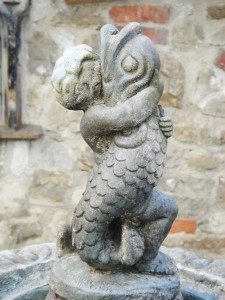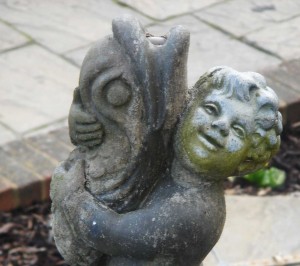This is a fountain at the Grasshopper Inn just outside Westerham, Kent. There is no attempt to disguise the act of having sex with a fish. The only concession to the ichthyophobic prejudices of the community at large is that the human participant has been presented as a cherub, one of those Renaissance fripperies that served to gloss over the great and terrible aspects of the angels in the polytheistic pantheon of Christian supernature.
Theological nonsense has encouraged us to think of angels as sexless, possessing no genitalia. This is an academic consideration, angels being mythical. However, the representation as a cherub of the person penetrating the fish shows the extent to which one particular member of the 18th century English aristocracy needed to manage his reputation among the populace. Before the advent of the familiar mass media, public art was the manner in which the image consultants of the time created public perceptions of those individuals who could afford it. King Charles I imported Dutch artists who could paint him in heroic guise on horseback, leading England to victory. It didn’t matter that he did none of this: it mattered that the public saw images of him doing so.
Sir Felix Westerham was an aficionado of the new orientalist hobby of keeping Koi Carp. A modest man in most other aspects, he was eager to have the biggest and the best of these stylish Japanese beauties. He became enamoured of one fish in particular and, when alone, would enter the pool and frolic with his favourite. The problem was that an 18th century nobleman was never alone. The number of staff required to attend to the running of Westerham Hall meant that it was inevitable that Sir Felix would be caught out. The story spread among his staff, into the village and throughout Kent. When veiled questions began to be asked in Parliament, Sir Felix recognised the need to take action.
Rather than confront the rumour directly, he worked in a manner that would be familiar to today’s viral advertisers. He commissioned a series of sculptures of classical figures engaged in congress with fish. He chose the central figures carefully, beginning with Zeus. Zeus, of course, was famed for adopting other bodily forms for the purpose of sexual subterfuge although whether disguising oneself as a swan would break down the reserve of a potential conquest is debatable. Why should Zeus not have sex with creatures of other species? That was the sort of thing he would have done. Things were different in mythical times. The boundaries between species, between mortal and immortal, were not yet closed and fixed.
Every village in the vicinity of Westerham Hall received a statue of excellent craftsmanship from an anonymous benefactor. This was to be displayed in a prominent position, close to a pond of large fish. At the same time, Sir Felix employed a band of minstrels to wander the county and play free of charge at the public houses in the area. These talented musicians were recruited from Ireland and, among their more traditional repertoire, they performed a select range of songs involving interspecies sex. Some of these drew on the well-loved legends of relationships between fishermen and selkies. Some were based on European tales of swan maidens. All were intended to reduce the effect of the socialised aversion to sex with non-human animals.
On summer nights, the good yeomen of Kent would retire to their locals for ale and relaxation. To their delight, there would be an excellent band to entertain them. Under the influence of alcohol and romantic music, their inhibitions would disappear. They would wander contentedly from the hostelries into the night. They would then see a classical statue of some mythical dignitary writhing in ecstasy with a fish. The chain of inevitability would close with the presentation of a warm, shallow pond containing some large and beautiful koi carp.
The crisis was over for Sir Felix Westerham. No more questions were asked. Indeed, the more forward of his colleagues would congratulate him in his club for his excellent taste and his forward-thinking attitudes. Sir Felix died without fathering an heir. The church took over his estates. The Archbishop of Canterbury, John Moore, toured the region in 1788. Although a moderate and forward-thinking prelate, he recognised the difficulty in reconciling the imagery of Sir Felix’s statuary with scriptural injunctions, and ordered it to be destroyed. All that survives of Westerham’s artistic legacy are some statues of doubtful quality such as the one that stands to this day in the grounds of the Grasshopper Inn.

Categories: Uncategorized | No Comments »


